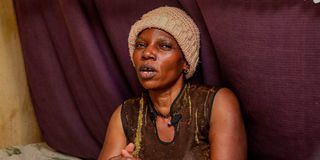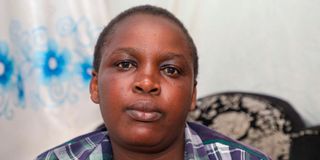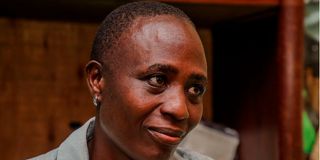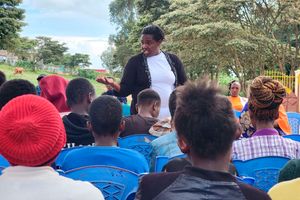
Top row: Doreen Karwira (left) and Annah Nekesa. Bottom row: Vicky Nasike (left) and Kalumu Ndumbo.
When Annah Nekesa got married for the second time, she was certain the second husband was different. The union, she thought, was her saving grace, because she was a single mother of two. She got four more children, but when her youngest turned five, she made a decision to walk away. Again.

Annah Nekesa during the interview at her home in Kware, Nairobi on December 2, 2024.
It was late evening; she vividly remembers how her husband’s drunken shouts filled the air just like they did the previous day and the day before that. She knew what would follow was a belt shattering against her skin, insults, and bruises that would take days to heal.
Clutching her lastborn child to her chest, Annah whispered to herself, ‘this is the last time.’ It had been 16 years of beatings, starvation, and humiliation. Her body was scarred and every scar told a story.
The turning point came in 2016 when she was diagnosed with Stage 3 blood cancer. She told her husband, hoping for a response that would lift her spirit. Instead he replied, “I cannot stay with a dead body!”
Annah remembers that night, because she had also asked her husband to help her raise about Sh35,000 for treatment.
“Besides the harsh words, he beat me so badly, my body looked like it had been stung by bees. As I lay in bed, I could not help but feel a deep sorrow,” she recalls.
That night, as her husband dozed off next to her in his drunken stupor, the 38-year-old packed the little she could into a small bag.
She wrapped the baby in a shawl and quietly left with the other five children.
“I keep getting flashes of him beating me to death, even while ailing with cancer. That is what pushed me to leave. It is also not that he provided for us food or other basic needs. He’d come home and eat whatever I had prepared for my children, then beat me afterwards for flimsy reasons,” she tells Lifestyle.
Today, four years after she walked away, she lives with her six children in a cramped, single room in Kware slum, Nairobi. The room’s only partition is a faded bedsheet that offers little privacy. In the room, there are three worn-out mattresses piled at a corner, their covers frayed.
A modest three-piece sofa-set occupies another corner. There is a collection of 20-litre jerrycans and a gas cylinder cluttered at another corner. When we arrived at 2pm, the room was already dark. We asked her to put on the light to brighten the room but she said the electricity had been cut off three days earlier.
“I pay Sh4,500 as rent, my children and I are safe and I have peace, however, I struggle to afford medication because it is expensive, but I thank God I am alive,” she says, struggling to move because of the pain in her spine.
Her first marriage in Kayole was a cage of physical abuse and emotional torment. Married and pregnant at 14 years, she entered a world she did not understand.
“At first, even when I was beaten, I did not see the need to leave. It did not feel like abuse, I thought it was normal. That wives are beaten. I got pregnant and my husband would leave me without food, come back home drunk, accuse me of infidelity and beat me,” she says.
When she got her second child, her husband would beat her as the older child watched.
“I remember once being beaten three days after giving birth, he beat me because I didn’t serve him food. It pained to watch my child cry seeing me being abused. I went back to mother's house,” she says.
After a while, her husband convinced her that beating is okay in marriage, but that he would stop it.
“It never stopped. I got tired and walked away,” she says.
Two violent marriages, she breaks the silence.
For Kalumu Ndumbo, the domestic violence started in 2017, when her son suddenly started experiencing seizures. He would convulse up to five times a day.
What followed was not just the diagnosis of cerebral palsy, but the opposite of everything she had once known — a happy family, a stable home. Her husband, once a provider, began to drift away. He would disappear for days, only to return drunk and indifferent.

Kalumu Ndumbu during the interview at her home in Mukuru kwa Njenga, Nairobi on December 2, 2024.
She would watch her son suffer as she faced spousal neglect and violence from her husband.
“We were fine when we had our firstborn. Things changed when our second-born was diagnosed with cerebral palsy (a condition that affect her child’s movement and posture.) He stopped buying food. I had to start washing clothes for people to earn money to buy food. After supper, he’d beat me for no reason. At some point I thought he was blaming me for our son’s condition,” says Kalumu.
For years, she endured physical abuse in the presence of her children, who were too young to understand why their mother was always bruised and scarred.
There were nights when she wondered if she should leave, but she had no one to turn to. She is an only child, an orphan, and her grandfather, the last member of her family, is too old to offer any help.
“Where would I have gone with four children? My husband was my only option,” says the 35-year-old, who has become a statistic in the 16 Days of Activism against Gender-Based Violence
But one day her turning point came. Her husband walked away. “He left when our youngest was only eight months old. I was left to raise four children on my own. I cannot say it did not hurt,” she says.
Even if the nights are quieter, with no violence, taking care of the children has not been easy. Kalumu’s son needs daily medication, costing Sh100 a day. She also has house rent of Sh1,800. There are days when she does not know where her next meal will come from.
Sometimes, she calls on friends to help watch her son while she works, but the worry never stops.
“It is so hard. Sometimes I wonder if I’m doing enough. When he misses his medication, I see how much he suffers. And it breaks me every time, but it's better like this than being beaten as my children watch,” Kalumu says.

Doreen Karwirwa gestures during the interview in Mukuru kwa Njenga, Nairobi on December 2, 2024.
Just like the two, Doreen Karwira, 35, recalls the day she met her husband with a mix of warmth and bittersweet emotions. It was at a restaurant where she worked as a waitress, her days filled with the hum of orders and clinking dishes.
He came in, and they spoke. Their connection was instantaneous, a deep bond born from a shared pain. Both of them had lost their parents and carried the scars of that loss.
For five years, Doreen believed in the life they were building. But what started as companionship turned into a nightmare. When her job ended, the man she once loved became someone else entirely. His frustrations erupted into violence, his words into sharp-edged insults.
Doreen tried to carry the weight of their crumbling life, finding another job to keep food on the table and her children in school.
“He would come home to the house I paid rent for, eat the food I struggled to buy, and then beat me for reasons I could not even understand, sometimes my eldest child would step in and cry out in an attempt to stop him,” she says.
The abuse was relentless. He hurled objects, shouted insults, and even threatened her with knives. Doreen endured it all, her prayers growing more desperate with each passing day.
“I believed he was the man God gave me. I thought if I prayed hard enough, things would get better. But I was wrong,” she says.
One evening her husband held a knife and threatened to kill her. In that moment, fear turned into clarity.
“I remember it was in July when I told him enough was enough, I told him I couldn’t afford to pay for everything and still feed him. When I told him to move he knocked me. That was it, I could not let my children grow up in a home filled with violence. I could not die and leave them alone,” she says.
Doreen left, her three children by her side, carrying nothing but their will to survive. She walked away, determined to rebuild her life and create a safe, loving environment for her family.
“I may have lost a part of myself in those years. It has been two years since I left, but what matters is I am alive. I found my strength in leaving,” she says.
Societal norms and attitudes continue to perpetuate gender-based violence in Kenya. For instance, a 2022 report from the Kenya Demographic and Health Survey indicates that 43 per cent of women aged 15-49 believe it is acceptable for a husband to beat his wife under certain circumstances.
Additionally, about 23 per cent of girls in Kenya are married before the age of 18, with higher rates in rural and marginalised communities.

Vicky Nasike at her home in Mukuru kwa Njenga, Nairobi on December 2, 2024.
Another case of emotional turmoil is that of Vicky Nasike. She has spent the last five years navigating the emotional aftermath of her tumultuous marriage.
The father of her two children, a daughter who will be in Form Three next year and a son entering Grade Six, has been absent from their lives.
“He was the type who could not settle with one woman. He would come home without food, be away for days, and then return. I used to look for him. It was not until 2020 that he decided to leave for good. I swore to myself that I would never go look for him ever again,” says the 37-year-old.
Though Vicky’s husband never physically harmed her, the emotional neglect and abandonment left a deep impact. The constant uncertainty about his whereabouts and his sporadic presence created a mental strain.
“I was so stressed about where he was and whether he was okay. My mind was not settled at all, I regret my decision of my choice of partner because this is not how I thought my marriage life would turn out, the emotional torture was too much. He was not a provider, I did everything on my own,” she says.
Despite her efforts to create financial stability, starting a small kiosk outside her home and saving what she could, Vicky continues to face the challenges of struggling to pay rent and providing for her children.
"Sometimes, we go to sleep on an empty stomach, and it is better like that rather than my children and I being stressed about a grown-up man, who does not care about our existence,” she tells Lifestyle.












